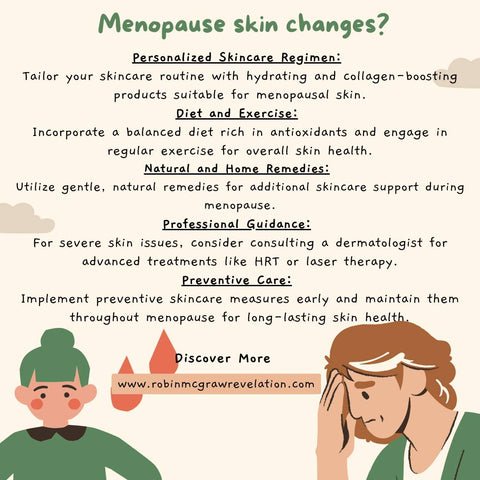
Menopause and Skin Changes: Effective Strategies for Healthy, Radiant Skin
Introduction
Menopause, a natural phase in a woman's life, brings about significant hormonal changes, often manifesting visibly in skin health. This article delves into understanding and effectively managing these skin alterations, ensuring that women can maintain their skin's radiance and vitality during and after menopause.
Understanding Skin Changes During Menopause
As women enter menopause, their skin undergoes noticeable changes, primarily due to a decline in estrogen levels. This hormonal shift can lead to decreased collagen production, resulting in skin that's less elastic and more prone to wrinkling. Simultaneously, many women experience increased dryness as their skin's natural oils diminish, alongside a potential rise in hormonal acne due to the imbalance of estrogen and testosterone.

Essential Skincare Routines for Menopausal Skin
Adapting skincare routines during menopause is crucial for maintaining skin health. It's advisable to incorporate products that are rich in hydration and capable of boosting collagen production. Ingredients like hyaluronic acid, glycerin, and peptides become vital. Additionally, switching to gentler, non-drying cleansers and integrating nourishing night creams can profoundly benefit menopausal skin. Regular use of sunscreens to protect against UV damage is also indispensable.
The Role of Diet and Lifestyle in Managing Menopausal Skin
A wholesome diet and a healthy lifestyle play pivotal roles in skin health during menopause. Foods rich in antioxidants, such as berries, nuts, and green leafy vegetables, can combat free radical damage. Omega-3 fatty acids, found in fish and flaxseeds, are essential for maintaining skin hydration and elasticity. Adequate water intake is equally important to keep the skin hydrated from within. Regular exercise boosts circulation, enhancing skin tone and texture.
Coping with Dry and Aging Skin: Practical Tips
To effectively manage dry and aging skin during menopause, emphasis should be on deep hydration and gentle care. Opt for hydrating serums and creams that lock in moisture. Avoid harsh exfoliants and opt for mild, enzymatic exfoliators that do not strip the skin of its natural oils. Incorporating facial oils rich in vitamins and antioxidants can provide an extra layer of nourishment. Regular facial massages can stimulate blood flow, aiding in skin rejuvenation.
Natural Remedies and Home Solutions
Embracing natural remedies can be a soothing and effective way to care for menopausal skin. Homemade masks with ingredients like avocado, honey, and oatmeal offer hydration and gentle exfoliation. Aloe vera and cucumber are excellent for calming irritated skin. Essential oils like lavender and chamomile, when diluted, can provide soothing benefits. However, it's crucial to patch test any new ingredient to avoid adverse reactions.
Advanced Treatments and Therapies for Severe Cases
For more severe skin issues during menopause, there are several advanced treatments and therapies available. Hormone replacement therapy (HRT) can be an option to balance hormonal levels, potentially improving skin condition. However, it's essential to discuss the benefits and risks with a healthcare professional. Other treatments like laser therapy and microdermabrasion can address issues like uneven skin tone, deep wrinkles, and loss of elasticity. Consulting with a dermatologist can provide personalized advice and effective solutions.
Preventive Measures and Long-term Skin Care Strategies
Prevention is key when it comes to maintaining healthy skin during and after menopause. Starting a skincare regimen focused on hydration and protection before menopausal changes begin can have long-lasting benefits. Regular use of broad-spectrum sunscreen, avoiding smoking, limiting alcohol consumption, and managing stress are all crucial steps in preserving skin health. Additionally, establishing a consistent skincare routine that includes gentle cleansing, moisturizing, and periodic exfoliation can support skin resilience throughout menopause.
Conclusion
Menopause is a transformative period in a woman's life, and understanding its impact on skin health is vital. By adapting skincare routines, embracing a healthy diet and lifestyle, and seeking professional advice when needed, women can effectively manage the skin changes associated with this phase. Remember, every woman's journey through menopause is unique, and so is her skin. Embracing this change with the right strategies can lead to enduring skin health and confidence.

